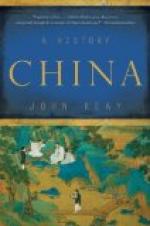The ideological justification for a new marriage law was the desirability of destroying the traditional Chinese family and its economic basis because a close family, and all the more an extended family or a clan, could obviously serve as a center of resistance. Land collectivization and the nationalization of business destroyed the economic basis of families. The “liberation” of women brought them out of the house and made it possible for the government to exploit dissension between husband and wife, thereby increasing its control over the family. Finally, the new education system, which indoctrinated all children from nursery to the end of college, separated children from parents, thus undermining parental control and enabling the state to intimidate parents by encouraging their children to denounce their “deviations.” Sporadic efforts to dissolve the family completely by separating women from men in communes—recalling an attempt made almost a century earlier by the T’ai-p’ing—were unsuccessful.
The best formula for a revolution seems to involve turning youth against its elders, rather than turning one class against another. Not all societies have a class system so clear-cut that class antagonism is effective. On the other hand, Chinese youth, in its opposition to the “establishment,” to conservatism, to traditional religion, to blind emulation of Western customs and institutions, to the traditional family structure and the position of women, had hopes that communism would eradicate the specific “evil” which each individual wanted abolished. Mao and his followers had once been such rebellious youths, but by the 1960’s they were mostly old men and a new youth had appeared, a generation of revolutionaries for whom the “old regime” was dim history, not reality. In the struggle between Mao and Liu Shao-ch’i, which became increasingly apparent in 1966, Mao tried to retain his power by mobilizing young people as “Red Guards” and by inciting them to make the “Great Proletarian Revolution.” The motives behind the struggle are diverse. It is on the one hand a conflict of persons contending for power, but there are also disagreements over theory: for example, should China’s present generation toil to make possible a better life only for the next generation, or should it enjoy the fruits of its labor, after its many years of suffering? Mao opposes such “weakening” and favours a new generation willing to endure hardships, as he did in his youth.




